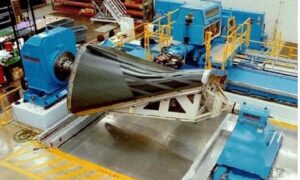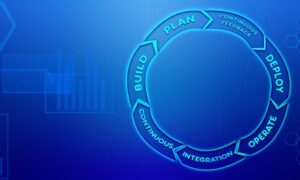DevOps is the fastest way to develop and deliver applications and technologies. It is a set of useful techniques, tools, and strategies implemented in the development process of a product that results in quick feedback and implementation of changes. A skilled DevOps engineer is equipped to deliver effective solutions that improve the project workflow. This article discusses the different skills that software developers and engineers need to become successful DevOps engineers, the various roles and responsibilities of a DevOps engineer, and more.
Who is a DevOps Engineer?
In a traditional development environment, software developers and engineers have defined roles in the process of a project. They work with their assigned role and responsibilities and pass on the product to the next person in charge. DevOps engineers operate differently from traditional software engineers. This difference is because they do not take the siloed approach. DevOps engineers work together throughout the product life cycle.
To be more specific, a DevOps engineer works with a combination of Agile and Lean methodologies through the product’s software development life cycle. He is equipped with advanced knowledge of different tools. He works with the other IT professionals in the organization to create the final product in the fastest possible way with the best possible results.
DevOps engineers are in high demand today because of the ever-changing nature of technology. Applications and products continuously need to be updated to keep up with consumer needs. If organizations want to stay ahead of their competition and build satisfying and consumer-centric products, they need to hire DevOps engineers.
Skills Required to become a DevOps Engineer
A DevOps engineer is a highly trained and certified professional who is one of the organization’s most systematic and efficient members. He is exceptionally skilled. The skills required to become a DevOps engineer can be obtained through rigorous training and completion of certifications. Some of the essential skills that a DevOps engineer needs to have are listed below.
- Scripting knowledge of languages such as Python, JavaScript, and more
- Basic Linux knowledge
- Experience working with and developing CI/CD pipelines
- Understanding of various DevOps and automation tools and other deployment technologies such as Git, Jenkins, Ansible, Splunk, and more
- Knowledge on how to use different cloud platforms
- Testing skills
- Communication skills
- Collaboration skills
- The mindset that is focused on continuous delivery and improvement
- Experience using Infrastructure as Code tools such as Terraform, CloudFormation, and more
- Continuous integration
- Configuration management tools
- Understanding of a container system landscape
- Thorough knowledge of all IT operations
- Working with and troubleshooting various operating systems
- Database administration
Great! Now you know the skill required to be a DevOps engineer. However, the question is there a right way to gain all these skills? We have got it covered. Listed below are the steps required to become a skilled DevOps engineer.
Roadmap to Becoming a Successful DevOps Engineer
The roadmap to becoming a highly skilled and successful DevOps engineer is made up of a lot of steps. These steps teach software developers and IT professionals how to create the DevOps culture and mindset in the team and implement it in their projects. The journey of becoming a DevOps engineer becomes a lot easier when professionals opt for the DevOps certification. It helps streamline the learning process and makes it easier for learners to understand the concepts, culture, and techniques. The steps to becoming a successful DevOps engineer are:
- Learning at least one programming language: Aspiring DevOps engineers need to be proficient in at least one programming language to script code successfully. Knowledge of popular languages such as HTML, JavaScript, Python is a necessity in the field.
- Linux: They also need to have a stronghold on the fundamentals of the Linux interface. They need to know how to use various Linux commands, networking commands, and the Linux shell.
- Knowledge of source code management tools: Candidates for the DevOps certification also need to know various source code management tools such as Git and Mercurial to help them with their project organization. The most widely used source code management tool is Git.
- Application building: The most critical part of a DevOps engineer’s job role is to build robust applications. He needs to have a thorough knowledge of how to use the various ways to work with the rest of the team to build applications quickly and efficiently.
- Knowledge of automation tools: These automation tools are CI/CD tools like Jenkins to automate the POM file to build the application, such as the set of jars, plugins that need to be installed, different commands that need to be executed, and more. Knowledge of automation tools also helps developers implement feedback and changes to their product. The quick feedback the developers receive helps increase the speed of implementation and improves overall workflow.
- Testing of built applications: After the application has been built, the next step is to successfully test the applications and fix bugs and any other issues with the final product. The developers should also automate the testing process. This way, developers can run multiple and parallel tests at the same time. One of the most popular testing tools for applications is Selenium.
- Deployment of applications: After the testing is done, the developers have to work together and follow DevOps practices to deploy the application they have built successfully. Different configuration management tools and containers are used to execute the deployment most efficiently. Some of the most popular tools used by DevOps professionals are Ansible and Docker.
- Monitoring of applications: This stage is when DevOps engineers identify various issues with the deployed application and then make changes and implement them in the fastest way possible.
- Knowledge of cloud computing: Cloud computing is an extremely important part of the DevOps engineer’s job profile. Knowledge of cloud technologies will help DevOps professionals understand cloud formation and its architecture, different deployment models, and more.
DevOps Engineers Salary Prospects
There are different levels of certifications that DevOps engineers can complete to gain expertise in the field. The certifications help improve the skills they have as DevOps professionals and increase their value in the job market. On average, DevOps engineers make an annual salary of $111,000 in the United States. DevOps professionals’ starting salary is $91,000, and it could go up to higher than $155,000 a year.
Where Should I Learn DevOps?
There are multiple certifications that IT professionals and software developers can complete to become professional DevOps engineers. Some of the certification options available are:
- DevOps certification
- DevOps Engineers Master’s Program
- CI/CD Pipelines with Jenkins Certification
- Ansible Certification
- Jenkins Certification
- A postgraduate program in DevOps
Conclusion
DevOps methods provide organizations with the tools they need to create, implement, and monitor their deployment cycles with every iteration. A certification in DevOps can benefit IT professionals and developers by equipping them with the skills they need to create successful products within a short span of time.



































